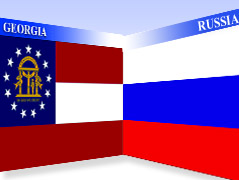Will anyone care about the Georgia war report?
 Brussels - There were great expectations in the international community ahead of Wednesday's publication of the report on the causes of the 2008 war between Russia and Georgia.
Brussels - There were great expectations in the international community ahead of Wednesday's publication of the report on the causes of the 2008 war between Russia and Georgia.
The European Union, which commissioned the report, "hopes that its findings can contribute towards a better understanding of the origins and the course of last year's conflict and ... serve as an input to future international efforts in the field of preventive diplomacy," the bloc said just minutes after it received the text.
But analysts question whether the long-awaited report will have any practical impact, because the EU has already decided on how to deal with Russia and Georgia after their brief but bitter war.
"People expected the report to be high-impact, but it turns out that it comes to conclusions which had already been drawn," said Uwe Halbach, security expert at the SWP German Institute for International and Security Affairs in Berlin.
The report, drawn up by Swiss diplomat Heidi Tagliavini, drew two main conclusions: that Georgia broke international law by attacking the separatist region of South Ossetia on August 8, 2008; and that Russia broke international law by then invading Georgia.
At first glance, it is a dramatic charge sheet, accusing two sovereign nations of breaking the rules of warfare and then trying to cover it up afterwards.
But analysts say that the report simply confirms what EU leaders believed as long ago as September 1, 2008, when in an emergency summit they said that military action such as Georgia's was "not acceptable" and that Russia's response was "disproportionate."
"It's not an earth-shattering report: most of the points were already well known," said Amanda Ackakoca, policy analyst at the European Policy Centre (EPC) in Brussels.
At the September 2008 summit, the EU froze talks on a new treaty with Russia in a sign of its discontent. But it re-opened them just months later, and is now working with Moscow on issues ranging from World Trade Organization accession to Iran's nuclear programme.
"One year ago, the EU was talking about there not being business as usual. Now they are definitely back in business, because there are other issues on the table which are more important," Ackakoca said.
By the same token, after the war the EU offered Georgia a place in an "Eastern Partnership" aimed at bringing it closer to the EU - despite concerns within the bloc about its role in the war and about the democratic credentials of its president, Mikheil Saakashvili.
"Many aspects of the report were quite favourable to Georgia. It's not in the EU's interest to put the brakes on the relationship now," Ackakoca said.
And analysts question whether the report will even have any impact on Saakashvili's standing at home, after a year in which opposition figures have repeatedly accused him of blundering into war.
"The opposition is in a weak position at the moment - it's scarcely possible that this report would suddenly give them wings," Halbach said.
"Saakashvili is a tough, wily old fox politically: it will take a lot to dethrone him, and this report won't have that effect," Ackakoca said.
That leaves Tagliavini's report facing an unenviable future as a historical text which explained everything - and changed nothing.
"It's positive that they produced it, but whether it will be as helpful tool in the future, I doubt. It will probably end up just gathering dust on a shelf," Ackakoca said. dpa